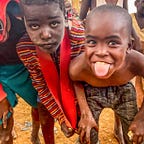Somali women poets: speaking up and speaking out
UNDP’s Home of Somali Poetry initiative gives a new platform to women writers and celebrates their work in an annual award
There have always been Somali women poets writing and performing in different styles, expressing their views on everything from political representation to war, revolution and inequality. But they haven’t always been able to find an audience or been fully recognised for their talents.
For most of history, Somali poetry was 100% an oral tradition and poems spread through professional reciters who would memorise and perform them at events around the country. There weren’t any women reciters and men didn’t want to memorise women’s work, so public performance of women’s verse was largely restricted to family occasions.
Then came radio. Suddenly women could reach a huge audience without the need for men to speak on their behalf. In the 1970s, women’s poems, read by women themselves — sometimes as part of propaganda drives for different ideological movements — took to the airwaves or were recorded on tapes that could travel to other towns and countries, even when restrictive cultural practices meant that women themselves were not allowed to go in person. They were outspoken, they were political and they were immensely popular.
Then the explosion of another new technology — social media — opened up further opportunities for women poets to be heard and to use their voices to speak up for other women. You didn’t need to be famous or have the support of any political group: you could reach an audience on your own channel, in your own way.
Mogadishu-based poet Ismahan Araweelo is one young woman whose poetry has become popular online. Her verse champions Somali culture and the value of women, like this poem called Somalis are a single tribe:
Somalis are just single tribe with a common language.
They are kin and family,
Living in the east of Africa,
Devoid of tight-fisted people.
They are blessed with kings too.
They produce women with mesmerizing beauty, who are more competent that 100 boys.
Their come from a place called nomadism and they have cultivated their heritage.
Then there is Hawa Jamil Abdi, whose Facebook account regularly brings her work to new audiences, showcasing a remarkable voice that is not afraid to address controversial topics, including political corruption and failures of leadership. Her poem Sadness attacks many of what she sees as the causes of Somalia’s difficulties:
We are a dignified and independent country, not colonized by another government.
Choosing an official who does not work with his administration, a fool who do not know what he wants and gets instructions from abroad: isn’t this sadness?
You are millions of people at war with an enemy with little power and surrounded by lions, so to disagree on small matters and not be able to solve them, isn’t this sadness?
There is fire and trouble in our cities and our bodies are shattered by landmines.
Our seas are depleted of fish, our land is attacked by the enemy and you are busy with nonsense: isn’t this sadness?
It ends with a powerful call for a new approach to leadership:
Elders and intellectuals, you need to think about bringing lasting solutions to our people.
Our country deserves more than this… foreign wealth won’t help us in the long run.
“In short, poetry is a weapon for me,” said Hawa in a recent interview for Swedish radio facilitated by UNDP. “I convey my point of view, I advocate for people with disabilities, and I also talk about social and political issues in our country.”
But Somalia’s is still a culture dominated by men where many women feel they are unable to speak up or be heard, so UNDP’s latest communications initiative, called the Home of Somali Poetry, has a special focus on women poets. The initiative’s website showcases the work of established and new women writers and features interviews and profiles of women poets. Each year, the initiative also runs the Home of Somali Poetry Awards, with a special category for Woman Poet of the Year.
This year, the Woman Poet of the Year Award was given to Raxma Huseen Huriye for a poem on Somali culture and values and the danger society faces if these are lost.
Raxma comes from a family of poets — both her father and grandfather wrote poetry — but she’s the first woman in the family making a name for herself in literature.
The Home of Somali Poetry initiative is also involved in special advocacy campaigns, including a new collaboration with the Somali Arts Foundation, which is bringing together women poets, photographers and videographers to work together to highlight the issues of most concern to them. The project will feature an online exhibition of their work for Human Rights Day on 10th December, followed by a physical exhibition in Mogadishu.
UNDP’s Home of Somali Poetry (Hoygamaansada) initiative aims to preserve and promote Somali poetry, foster peace and unity around a shared cultural identify and advocate for human rights and women’s empowerment. The Hoygamaansada website hosts a comprehensive archive of some of the finest Somali poetry across the ages and an expanding database of poets, as well as an online magazine that offers a platform to newer poets and covers news and education articles on all things related to Somali poetry.
The Home of Somali Poetry initiative also hosts an annual Somali Poetry Awards to recognise the very best creative talent, including the Woman Poet of the Year prize sponsored by UNDP.
To find out more about the Home of Somali Poetry and the 2021 Somali Poetry Awards, visit the website or follow us on social media: Twitter: @hoygamaansada, Facebook: @hoygamaansada, Instagram: @hoygamaansada, YouTube: https://tinyurl.com/yxfrcnsk
